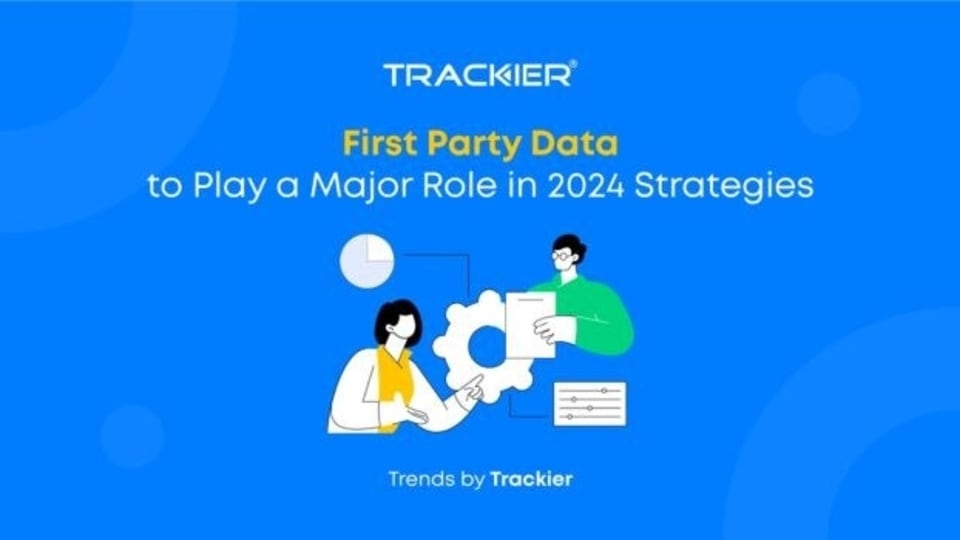First Party Data to Play a Major Role in 2024 Strategies: Trends by Trackier
Stepping into the cookieless era, brands are now devising strategies to gather around user data

New Delhi (India), February 16: With the year 2024, agencies and the advertising industry are going to face a tremendous challenge and a major change which is a cookieless future. However, not to focus only on the negative part, this change came with something good as well- promoting first party data usage.
One of the reasons being that since last year Google itself has delayed this change giving us a huge bandwidth to devise strategies and plans to leverage this first party data. Agencies and advertising industry all across the world are taking this delay as a major benefit and coming up with strong advertising strategies.
Here's how to leverage this first-party data.
It has been observed that around 75% of marketers and advertisers are still relying on the third-party cookie data. However, with this transformation, this trend is bound to change and here's how.
This first party data is in a way a left-over of all the cookies that have been in the industry for a long period of time. We all need to understand one basic thing which is the consumer behavior, their shopping and browsing pattern observed on different devices which is one of the best approaches when it comes to third-party cookies alternatives.
Additionally, there are a lot of D2C (direct to customer) brands that have a head start with the implementation of first-party data collection strategies. Hence, several other advertising agencies and brands are getting reliant on these D2C brands for the first-party data.
This is not the only scenario. One such example can be seen when Publicis Commerce (a marketing agency) partnered with a brand to release a mobile application for users to engage. This app engaged the users by asking them simple questions and later showed them personalized content as per their preferences. This partnership is a smart way for a marketing agency to collaborate with a brand and help gather first-party user data while also complying with data privacy. This entire initiative is a great case study on how brands can collaborate to collect user data without relying on the cookie system.
Collecting First-party Data
Stepping into the cookieless era, brands are now devising strategies to gather around user data, and here are few points to consider while devising a strategy for the same:
●Keep the process conversational to engage the customer.
●Clearly mention what's in store for users in exchange for the information.
●Offer something in return to the customer.
●Keeping the customer behavior and preferences in mind.
●Offering the customer discounts, added benefits.
Moving on, the struggle for collecting first-party data has already begun and brands are fighting neck to neck to get customer information as much as they can. Here are some of the major effects that would be visible on the majority of agencies and marketers.
●Behavioral targeting would be reduced.
Since with the cookieless phase it will become difficult for the brands to gather information about the users and their behavior, it would become difficult to predict the behavior and carry out the behavioral targeting.
●Retargeting campaigns would change.
Without user behavior data, retargeting would not be accurate and effective as it was with the data collected via the cookies.
●Lookalike audience targeting would be impacted.
Data collection via cookies would be impacted which would further become a roadblock in making lookalike audience targeting, since all the data would be collected via first party and zero party data.
●Programmatic ad buying would have an impact.
It would become difficult to determine or track the success of the campaign being targeted by marketers which was simpler with data collection via cookies.
What Strategy to Implement?
Having discussed the impact and other aspects of this cookieless transition of the digital industry. On a global level advertisers and marketers are recommending to consider a few points while devising the cookieless marketing strategy.
First and foremost, the focus should be on leveraging first-party data via different campaigns where the user is willing to share the details and information in exchange for some additional benefits. This would motivate or push the user to share their information and engage with your campaigns.
Additionally, for this you need to have a clean source of right information and data or a data lake that you can trust for offering you reliable data insights.
Secondly, build trust with the customer. As a brand or agency, you need to build a relationship based on trust with your customer so that they feel confident and comfortable in sharing their information and details with you. Maintain transparency with your customers and it will help you in the long run.
Additionally, understand the customer behavior and how they are interacting & engaging with the content available on the website. This would help you understand the preferences of the customers and offer personalized content and experience to them.
Since every user reacts differently to websites, understanding the pattern will help the brands to focus on the user's preferences and offer them further offerings based on their preferences.
Personalization is going to play an important role here as in a report it was concluded that around 90% of consumers have switched to a different brand for better and personalized experience and are willing to do the same in the coming future as well. But here's the bottleneck – How to personalize without user information?
Answer lies in first party data. Using the information that is freely offered by users during their interaction with your brand can help you personalize your communication with customers. For example: You know a customer A engages with your brand for their X requirements, it would be advantageous for your brand to target customer A with relevant marketing material, promotions, and product recommendations related to X.
Commenting on this, Faizan Ayubi, CEO & Co-Founder of Trackier said, “The end of third-party cookies is not an END, but the beginning of a new era in marketing. An era where personalization and privacy will coexist in harmony. Brands that are leveraging consumer trust and transparency will surely lead the race in 2024 by example, championing a future where tailored experiences and data privacy are equally prioritized. Trackier is also doing its bit by educating our users about alternative methods to third party cookies tracking and how they can reduce their dependence on cookies for targeting and personalization.”
Concluding Thoughts
From the above-mentioned stats and reports it can be concluded that the end of third-party cookies is not the end of the world. It will in fact, usher in a more sustainable and privacy-friendly era that will help both brands and customers in the long run. Customers can value their data privacy while brands can build a stronger relationship that doesn't invade customer's privacy. Agencies need to rework on their marketing strategies and integrate the aspect of first party data and personalization for obtaining that data.
Disclaimer: This article is a paid publication and does not have journalistic/editorial involvement of Hindustan Times. Hindustan Times does not endorse/subscribe to the content(s) of the article/advertisement and/or view(s) expressed herein. Hindustan Times shall not in any manner, be responsible and/or liable in any manner whatsoever for all that is stated in the article and/or also with regard to the view(s), opinion(s), announcement(s), declaration(s), affirmation(s) etc., stated/featured in the same.
Catch all the Latest Tech News, Mobile News, Laptop News, Gaming news, Wearables News , How To News, also keep up with us on Whatsapp channel,Twitter, Facebook, Google News, and Instagram. For our latest videos, subscribe to our YouTube channel.


























